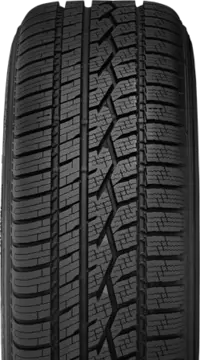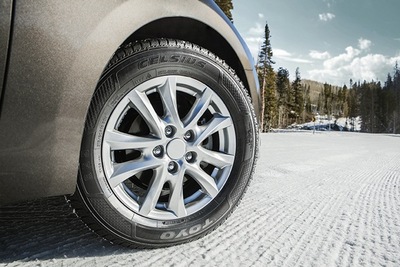TOYO CELSIUS "Variable Conditions" Tire Review By Steve Purdy
TOYO CELSIUS, A hybrid tire combining winter and all-weather designs
By Steve Purdy
Senior Editor
Michigan Bureau
The Auto Channel
Just before winter began to set in here in Michigan the Toyo Tire folks contacted me with a request to review their new Celsius® “Variable-Conditions” tire, a product I gathered is a hybrid intended to combine the attributes of all-weather and winter tires. Great concept, I thought, so I put a set on my 10-year-old Lexus RX330 and waited for the snow and ice. And, I waited some more. It’s now February and we’ve had just a few opportunities to use these new treads in challenging conditions but I have just enough experience with them to offer an opinion.
These tires use a new asymmetric winter tread design with an all-weather tread compound in an attempt to get the advantages of both without the disadvantages of either. Other tire makers, in particular Michelin and Cooper have attempted to do something similar but they have taken the opposite approach, according to Colin, our knowledgeable resource guy at the local Bell Tire store. Michelin and Cooper (actually the latter’s Master Craft brand) use a summer tread pattern with a winter compound.
Disadvantages of each are that the winter compounds tend to wear more quickly because they are softer, and the more open and coarse tread patterns of winter tires tend to be more noisy at speed. Now, that’s a bit of an oversimplification but it will set the scene.
 TOYO CELSIUS |
So, how do they perform? While our experience is relatively limited I can confidently say they perform well, so far.
Our first couple months with the TOYO CELSIUS tires on the Lexus we had mostly normal dry weather but we did have a couple road trips, including one to Chicago, where we gained a good sense for highway manners. They felt stable and were quiet enough not to bring attention to themselves. We could discern no hum or drone you might expect from a conventional winter tire. Sidewalls produced no squirm. The freeways we take on our regular jaunts to Chicago are rather rough in places so I expect we would have noticed any tire issues.
Then, fortunately, we experienced a nice winter storm with about 4 inches of wet slushy snow. It did not last long but we had a few days of bad roads. We live about 10 miles out into the country and I first challenged the tires on a drive into town through the slush. Giving it every opportunity to slide I weaved back and forth into and out of the slush-ruts without any unsettling of the car’s trajectory.
About a month later we had some bitterly cold light snow that compressed into a nice, icy glaze on our country roads. Both going and stopping felt fine. Since then we’ve had a few short-lived winter weather events, including some dry snow that drifted in a brisk wind. I blasted through the drifts over and over attempting to get a feel for the tire performance, and again, they felt plenty competent.
Certainly, this has not been a winter season that offered a good test of tires, but the experience I’ve had with these TOYO CELSIUS Variable Conditions tires leaves me with no concerns about using them in any conditions.
Thinking ahead, let’s say you need a new set of tires on your sedan or crossover. Or, you’re sending your kid off to college in a northern, not a mountain, climate and her car needs new tires. In any case you’ve been thinking about the advantages of having winter or all-weather tires to maximize your vehicle’s performance in all conditions. The cost will be a bit less than a premium all-weather tire and a bit more than a basic snow tire or low-end all-weather.
If you want to maximize performance for winter and summer you’ll need two sets of tires but these are an excellent compromise when you’re dealing with intermittent conditions like we do here in Michigan.
Since we’ve not experienced the Michelin or Cooper variants of the variable conditions tires mentioned above we cannot make a comparison, but we are entirely happy with these.
The TOYO CELSIUS Variable Conditions tires are available only in the U.S. in sizes to fit most sedans and crossovers for now and come with a 60,000 warranty. Retail prices are around $100 each.
Now it is late winter here and we often get our best snow storms in March or even early April. So if we get a more thorough opportunity to test these tires we’ll update the review here.
©Steve Purdy, Shunpiker Productions, All Rights Reserved



